Millennials

The zeitgeist is clear. Much like Emmett Till’s murder in 1955 sparked the civil rights movement, the tragic string of murders of blacks in 2014 catalyzed another movement, the #BlackLivesMatter movement. This movement picks up where the civil rights movement left off, addressing systemic racial injustice in the legal and penal system, educational system, and economic system. In some ways, the battles we fight are more challenging than the ones our grandparents fought. Undeniably, we face off in a more complex world and against forms of systemic racism that are so subtle that they are almost invisible. Nevertheless, due to a unique combination of gifts and experiences, I’m hopeful that my generation of black millennials is ready to lead us on to a more equitable society. Here’s why.
1. We are propelled by the prophetic legacy of the past.
With a technological savvy that gives us unprecedented access to the true history of our people, and as perhaps the last generation to breathe the same air as the civil rights generation, we draw upon the legacies of the past as we move forward. When I sense that my capacity to forgive is waning, I recall my recent conversations with several survivors of the 16th Street Baptist Church bombing in Birmingham, Ala., and I’m reminded of the inner healing that forgiveness promises. When I am tempted to pander to the powers that be, I call my radical granddad and ask him to tell me again about the many Black Panthers meetings that took place at the church he pastored in Berkeley, Calif., in the 1960s. When I feel that I’m losing my courage, I read Ida B. Wells’ autobiography and am reminded that we are not alone. We are connected — part of a chain of black activists, each generation inspiring the next. Our heroes guide us every day.

A lot has been written about the decline of the mainline church over the years. Numerous theories have been passed around. Nearly every pew-sitting faithful Christian in America has her or his own opinion. As a minister I have heard a lot of these complaints from the masses; the request is simple. They want the church to be the center of social and political life as it seemed to be in the 1950s and 1960s. They want the pews packed with people, the nursery overflowing with babies, and the church to have the same level of particularity that it did years ago. The church today finds itself having to share time and attention with the rest of the world. Because of this (and numerous other factors), the church for the most part has seen the number of people attending the hallowed halls of a church house begin to decrease.
In an effort to find a culprit for the shrinking size and popularity of church, a scapegoat has been named and they are "young people today” — a catchall term for people under the age of 35 (or thereabouts) who have seemingly left the church en masse.
They are vilified as the sole reason and cause for the church to not be busting at the seams with people. If only those "young people" could just stop being so selfish on Sunday mornings and just come to worship God at 11 a.m. like people have been doing for years, the world might be a better place.

Jesus was clear.
You cannot serve both God and money.
Throughout my 20s, this was not a problem I thought I struggled with.
First of all, I didn’t perceive myself as having all that much money. So, how could I be serving it? (I deal with the inaccuracy of how I perceive of my own wealth here.)
Second, money was never a part of my thought process when choosing my career. If money wasn’t the motivator for choosing my job, how could I be in danger of “serving two masters?”
It’s been said that one of the greatest tricks devil ever played was convincing most of the world he doesn’t exist. His greatest encore might be wrapping up vice in the midst of a big ball of virtue and letting the whole thing rot from the inside out.
I might not struggle with being a slave to money in the sense that I obsess about how much I make. But, in looking back over the past 10 years of my life, I’ve found myself serving the master of mammon precisely in the ways that I DIDN’T think about money.

A study came out recently saying that millennials (a category that I apparently fit into) consider ourselves the “post-racial” generation. By and large, young adults think they are the ones who have moved past racism.
Except, that’s not true. Racism is alive and well.
Here at Sojourners I’m privileged to be a part of enlightening conversations about diversity, racism, sexism, and a whole host of other injustices. This makes it all the more frustrating when I try and continue those conversations outside the Sojourners community, and I’m met with resistance. Most of my friends are extremely uncomfortable discussing race. And not just because it’s a taboo subject; this is D.C., after all, and politics are always fair game in friendly discussion. Instead, I’ve found that my friends are so unsettled by the subject that they either try and change it, or they tell me it’s not about race, it’s about income inequality. Those arguments, which I follow up with “where do you think the income inequality came from?,” are still met with resistance, and arguments that if we could just bring people out of poverty, the racial disparities would vanish.
Except they wouldn’t.
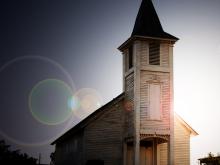
To the dying church,
The ongoing decline of American Christianity is well documented. A quick Google search of “mainline decline” provides statistics, commentary, and variously tried and discarded solutions related to the struggles of liberal protestantism in the United States. More recently, these trends are showing up in conservative Christian circles as well. The attention of the media, religious scholars, and cultural warriors has been captured by the rise of the “nones,” the “spiritual but not religious,” humanists, and evangelistic atheists.
It is clear who’s ascending and who’s falling. Organized religion is doomed. You, dying church, are in trouble.
I have seen your sickness up close. The congregation where I was baptized — once full on Sunday mornings — now barely hangs on. The church where I preached in college has long since closed its doors. My pastor friends spend their days worrying about shrinking worship attendance and a lack of financial resources for carrying out their ministry. Denominations pause from fighting and splitting just long enough to make budget cuts and lay off staff.
What can be done? What should be done? Is this a new reality that we simply must accept?

As the Pew Research Center recently found, today’s young people are “less likely than older generations to be affiliated with any religion.” The question is whether this trend is a good thing or a bad thing.
If you are a person of faith, you may worry about the souls of these “millennials,” the generation born after 1980. If you are a critic of organized religion, you may rejoice.

Last week as I was scrolling through my Facebook news feed, I came across a post from Dr. Timothy Keller, one of the founding members of The Gospel Coalition, who has been known for his very intellectual and reasonable perspective on a variety of issues that his other conservative colleagues have not been so balanced on. However, one of his recent comments surprised me, seeming to further a false narrative about millennial evangelicals that we are a generation of spineless, selfish, and scared hipsters:

I immediately was taken aback when I came across this post. As a millennial who has been actively involved in the conversation surrounding what faith, life, and church will look like for my generation, it is abundantly clear that the image that Keller paints has little to no grounding in reality. In fact, I would argue that one of the biggest desires of millennials is that we would be involved in deeply intimate communities that allow us to express ourselves openly, ask the questions to arise in our minds without fear of judgment, and give us a tribe of people that will walk with us through the ups and downs of life. In fact, this desire for intimate community is a direct response to the lack of community we have grown up with, especially in the evangelical world with our sterile megachurches that make true community nearly impossible.

Yesterday morning, an op-ed piece went live on CNN by a young evangelical author named Daniel Darling, titled " Millennials and the false ‘gospel of nice.’ Darling’s piece is clearly written in response to many recent articles — like Rachel Held Evans’ recent piece "How evangelicals won a culture war and lost a generation " — which argue that many of the leaders of evangelical Christianity have abandoned the core convictions and teachings of Jesus Christ and instead have leveraged their faith as a weapon to be used against anyone who disagrees with their political and moral principles that they claim are rooted in Scripture.
All of this is very fresh in our minds as news broke yesterday that Christian relief organization World Vision lost more than 10,000 child sponsorships from people who disagreed with the organization’s policy change on hiring people in legal same-sex marriages. To many who watched this controversy unfold, this is an utter travesty. It seems simply unfathomable that anyone who claims to follow Christ could justify removing support from the impoverished children that they know by name because they disagreed with the organization’s hiring policy.
In his op-ed piece, Darling argues that the cry of many progressive and millennial evangelicals is:
"If only orthodox evangelical leaders would give up their antiquated beliefs, get more in step with the real Jesus, the church and the world would be better off."
He then continues by saying that:
"embedded in this narrative are two presuppositions: Young evangelicals are fleeing the church at a rapid pace [and] the real message of Jesus looks nothing like orthodox Christianity."
When I read these comments in Darling’s piece, I was utterly fascinated. Because as a millennial evangelical, and one who is participating in these conversations on a national and international level, I have never heard a single person call for "evangelical leaders to give up their antiquated beliefs." I have never heard anyone say "the real message of Jesus looks nothing like orthodox Christianity." When I read Darling’s piece, it became crystal clear to me what the key problem is that is causing so much friction between the "old guard" in evangelicalism and us millennials:
The old guard has confused orthodoxy with their political and moral interpretations of Scripture.

Millennials are the worst generation ever, a recent study by the Pew Research Center confirmed. The other generations already knew that, of course, but the study has given them new insights into what characterizes me and my fellow Millennials beyond “They freaking love Starbucks” and “They refuse to move out of my basement.”
The study’s revelations include that we’re not making all that much money, we have tons of debt, we’re racially diverse, and we use the Internet a lot (curiously absent was the fact that 97 percent of us do not like being broadly defined or labeled or otherwise demographed). We also tend to shun institutions, including religious ones, at rates far surpassing our parents and grandparents.
This last little detail has not escaped the notice of conservative media outlets, whose reactions have ranged from cautious reserved judgment to something bordering on full-blown alarm.
Like a true Millennial, I don’t think things are all that bad (heck, I wouldn’t know where the panic button is even if I wanted to press it). Actually, as a Christian, I think there is a lot to be excited about in the generation that’s poised to inherit the world … after we move out of our parents’ houses, that is.

National attention on a proposed Arizona law allowing business owners to deny service for religious reasons to gay people signals how attitudes on social issues have shifted dramatically in recent years.
Experts said such changes will accelerate on issues such as same-sex marriage, interracial marriage, legalization of marijuana, and childbearing among the unwed. Younger people are more liberal and less conventional, they said.
“We’re entering a period of massive social change,” said sociologist Daniel Lichter, of Cornell University in Ithaca, N.Y. “This traditional pattern is reinforced by very large racial changes in America’s composition. The Baby Boomer generation — which is predominantly white and affluent and in some ways, conservative — in the next 20 [to] 30 years will be replaced by a younger population, and that population is going to be disproportionately minority.”
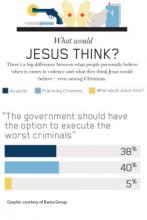
One day after the state of Ohio executed a man for murder, a new poll shows younger Christians are not as supportive of the death penalty as older members of their faith.
When asked if they agreed that “the government should have the option to execute the worst criminals,” 42 percent of self-identified Christian boomers, born between 1946 and 1964, said “yes.” Only 32 percent of self-identified Christian millennials, born between 1980 and 2000, said the same thing.
The poll conducted by Barna Group this past summer and released to Religion News Service Friday, surveyed 1,000 American adults and has a margin of error of plus or minus 2.6 percentage points.
It showed an even sharper difference in support for the death penalty among “practicing Christians,” which Barna defined as those who say faith is very important to their lives and have attended church at least once in the last month. Nearly half of practicing Christian boomers support the government’s right to execute the worst criminals, while only 23 percent of practicing Christian millennials do.
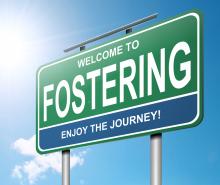
I WAS 7 years old when my family first opened our home to foster children. My parents were in their early 40s and already had four children at home. They were somewhat typical for foster parents at that time: married, established, often people of faith. We had a total of 10 children in our home—two of whom were adopted—from 1988 until 1997. Fostering children was a 24-hours-a-day, seven-days-a-week commitment and calling. As my mother would say, “God sets the lonely in families—but am I willing to let him set them in mine?”
This is a question that more Christians—particularly the oft-maligned Millennials—are asking themselves. They are examining both the sheer number of children growing up without families and scripture to see what it says about their faith. Taking their cue, and often their names, from James 1:27 (“look after orphans and widows in their distress”), groups in Colorado, Arizona, Oklahoma, Virginia, and most recently the District of Columbia have committed to looking after these modern-day “orphans in their distress.”
According to the Administration for Children and Families, in 2012 there were 400,000 children in foster care nationwide. Of that number, 102,000 were waiting to be adopted. Only 52,000 children were adopted in 2012; at the end of 2011, 15 percent of youth in the system lived in group homes or institutions. What is most troub-ling is the number of youth who “age out” of the system every year without the support of a family. At the end of 2011, 11 percent, or 26,000 youth in the system, aged out. These youth are much more likely to experience homelessness, health problems, unemployment, incarceration, and other trouble later in life.

For many, including myself, the past few weeks have been discouraging, given the state of our politics and culture and what many vulnerable people across the country are experiencing. But despite the frustration and even grief sometimes I have been reminded of the importance of “saving faith.”
My favorite Twitter response last week said this, “If all American Christians behaved as you do, I wouldn’t have to be such a huge a**hole of an atheist.” (Edits mine.) It came in response to a column I wrote about the new film, 12 Years A Slave (see it if you haven’t yet!), the continuing realities of racism in America that we still tolerate, and the need for churches to provide leadership in the changing demographics of the country by becoming the multiracial faith communities we were intended to be.
The week before saw many of faith leaders, pastors, and young people out in the rain at the U.S. Capitol during the government shutdown in a “Faithful Filibuster,” reading each day through the 2,000 verses in the Bible that speak of how we should treat the poor and vulnerable. One of those nights a family friend, the father of one of the boys I have coached in Little League baseball, came over to our house. He said, “You know I am an atheist, but I really admire what you are doing at the Capitol — that’s what Christians ought to be doing.”
Right after the government shutdown ended, Sojourners had our annual staff orientation. The program included each staff member telling their story of when and why they came to join us. Listening carefully, I was struck by how many Sojourners staffers recalled times in their lives when they were about to lose their faith, but rediscovered it after stumbling upon Sojourners. In my remarks to them that day, I also told stories of a few of the legion of people who have told me over the years of how they had lost or were about to lose their faith until they heard the messages about a faith that does justice.
It has all reminded me again how Sojourners began.
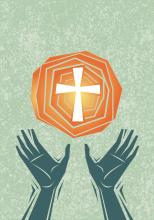
We're all exploring and asking, "What's next?" This particular question serves us well when we ask where our young people are.
"What's next?" and the related, "Who will take us there?"
So, this morning I was primed and ready to read "What Millennials don’t want from the church" by Rachel Sloan. It's a quick and worthy missive in which she says, "The most frustrating part of being a Millennial is that my church does not understand me." What specifically doesn't the church understand? Well, "Millennials (despite the terrible things you are told to believe about us) want real authentic, worship and real, authentic churches. We want churches that want to have a relationship with us."
Having made the same mistake many, many times, this time I decided to get my Millennial friends to chime in on the post. Some rightly reminded me that speaking on behalf of any one generation is an impossible task and presents certain rhetorical problems.

WASHINGTON — In the most comprehensive study of American Jews in 12 years, a strong majority said being Jewish is mostly about ancestry or culture, not the religious practice of Judaism.
“A Portrait of Jewish Americans,” released Tuesday by the Pew Research Center, shows strong secularist trends most clearly seen in one finding: 62 percent of U.S. Jews said Jewishness is largely about culture or ancestry; just 15 percent said it’s about religious belief.
“Non-Jews may be stunned by it,” said Alan Cooperman, co-author of the study. “Being Jewish to most Jews in America today is not a matter of religion.”

1) Jesus Avoided Labels
In fact, a large part of his ministry was breaking down preconceived titles, trying to bring about a world where there would be no differentiation between Jew or Gentile. He promoted the idea that loving God trumped racial, ethnic, social, religious, and political identities.
This doesn’t mean we’re simply “all the same underneath.” Jesus recognized that people had distinct differences, on both a personal and communal level. He embraced unique cultures and traditions and utilized them to reveal his glory, recognizing and valuin
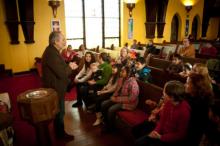
As Congress makes a final attempt this fall to act on comprehensive immigration reform, the debate is focusing on “securing” our borders and offering a path to citizenship to the 11 million residents here without proper documentation. These politicized arguments, however, don’t see the forest for the trees.
We’re not viewing the broader impact that immigration has had on American society, especially since the last major immigration reform of the 1960s. In particular, we’re missing the way immigration is transforming the religious life of North America.
We commonly view immigration as introducing large numbers of non-Christian religions into U.S. society. True, because of immigration in the last half century, America has become the most religiously diverse country in the world, with thousands of mosques and temples dotting our religious landscape.

I am an evangelical.
But what does that label even mean anymore?
A few days ago I was sitting around chatting with a few new friends at my Bible college. One of them was a young Canadian and another was a middle-aged former U.S. soldier. We ended up on the topic of politics and how many companies and businesses in the United States give millions to political and social causes and somehow we ended up talking about McDonalds.
My USAF friend made the statement: “McDonalds is terrible because it gives millions to causes and organizations that you [speaking of me] directly oppose: LGBTQ rights campaigns, Planned Parenthood, etc.” I was taken aback because my new friend simply assumed that because everyone in this conversation was an evangelical meant that we all held a certain set of political ideals and social standards. For him — for millions of others — evangelical meant something far more than a theological persuasion. In the midst of this awkward moment, I decided to reveal my identity as a politically progressive/liberal evangelical, which automatically caused an immense amount of tension to arise in our conversation. How could I, a Bible-believing evangelical, possibly support the LGBTQ community’s right to marry? How could I think that Planned Parenthood was doing any good and that President Obama’s plan to rapidly decrease the numbers of abortions in the United States was progress in any way? Let’s just say that the conversation ended on a pretty tense note.
This encounter really caused me to re-reflect on the magnitude that the term evangelical has been hijacked by political and social agendas over the past decade and how a new generation of evangelicals is emerging that does not at all identify with any of the social and political baggage that has come to represent evangelical Christianity. Which brings me back to my original question: What does the label evangelical even mean anymore?
I can tell you this — it doesn’t mean that I am a Republican. It doesn’t mean that I am a Democrat. It doesn’t mean that I am pro- or anti-anything.

So, here's the thing. I just met Rev. Alfred Williams. He's a retired UCC pastor. At 81, he's still preaching and teaching. He's still asking great questions and pushing congregations to do the same. When I am his age, I hope to be as passionate. Hell, I wish I were as passionate now. With that introduction, I want to share this sermon that he preached on Aug.18 of at Ladera Community Church.
I think this sermon serves to blow apart some of our assumptions about generational differences within church leadership. He preached on Mark 8:27-33.

Out of nowhere, I felt an urge to listen to Willie Nelson’s epic album Stardust, a collection of pop standards that went platinum when it was released in 1978.
As I listened to “Blue Skies” and “On the Sunny Side of the Street,” I remembered buying this album for my father. I thought he would enjoy a fresh take on these songs of his youth, his travails during the Great Depression, and the war that defined his generation.
I don’t think he ever listened to it a second time. He loved the songs, but he couldn’t bear the fresh take. He wanted Gertrude Lawrence, the original voices of Tin Pan Alley and Depression-era hopefulness, the crooners that carried his generation to war and back home again.
I understand. The music we hear at our first dreaming, first love, first dance becomes the soundtrack of our lives.
For many people, the same is true of faith. Our images of God, songs of worship and language of prayer tend to be those we acquired at first awareness. Many more images, songs and words will come later, but none might resonate so deeply as those that were imprinted on us early on.